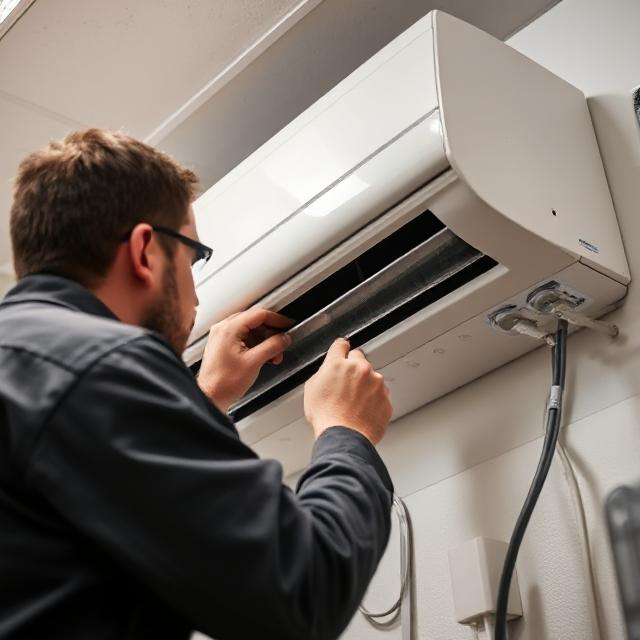If your air conditioner is running but not cooling, it could be due to a clogged filter, thermostat issues, low refrigerant, or a failing compressor. Some problems are easy to fix, while others may require professional service.
This guide will help you identify the most common causes, troubleshoot the issue, and decide when to call an HVAC technician for repairs. If you are in Middletown, CT, and neighboring areas, call Direct Home Services at 860-339-6001 for an inspection and a free estimate for repair service.
Common Reasons Your AC Is Running but Not Cooling

Common reasons your AC is running but not cooling include dirty filters restricting airflow, incorrect thermostat settings, blocked condenser coils preventing heat release, low refrigerant levels, frozen evaporator coils, faulty compressors, leaky ductwork, and electrical problems. More on these below.
Dirty Air Filter
A clogged or dirty air filter restricts airflow, making it difficult for your AC to cool. Dust, pet hair, and debris can accumulate on the filter, reducing efficiency and overworking the system. When airflow is blocked, cold air struggles to circulate, causing uneven cooling or warm air blowing from the vents.
To fix this, check your air filter and replace it if it appears dirty. Most 1-inch filters should be changed every 1-3 months, while high-efficiency filters may last longer.
Incorrect Thermostat Settings
Sometimes, the reason for your AC unit not cooling can be as simple as the thermostat being set incorrectly. If your thermostat is set to “fan” mode instead of “cool,” it will circulate air without actually cooling your space. Similarly, if the temperature is set too high, the air conditioner may not activate as expected.
Ensure that the thermostat is set to “cool” mode and adjust the temperature a few degrees lower than the current room temperature. If the system doesn’t respond, try replacing the thermostat batteries or resetting the device.
Blocked or Dirty Condenser Coils
The outdoor unit’s condenser coils release heat from your home. When these coils become dirty or covered in debris, they can’t properly dissipate heat, causing the air conditioner to run but not blow cold air.
To resolve this, inspect the outdoor unit for dirt, leaves, or debris. Gently clean the coils using a garden hose to remove buildup. For heavy dirt accumulation, a professional HVAC cleaning may be necessary.
Low Refrigerant Levels
Refrigerant is essential for cooling, as it absorbs heat from indoor air and releases it outside. The air conditioner may blow warm air if your system is low on refrigerant due to a leak. Signs of a refrigerant issue include:
- Warm air from vents despite the AC running
- Hissing or bubbling sounds near the cooling unit (indicating a leak)
- Ice buildup on evaporator coils or refrigerant lines
- Longer cooling cycles or the AC running constantly
- Higher energy bills due to inefficient cooling
- Weak airflow from vents
Since refrigerant handling requires specialized tools and expertise, we recommend calling a licensed HVAC technician near you to detect leaks, recharge the system, and perform necessary repairs.
Frozen Evaporator Coil
An evaporator coil can freeze if there’s insufficient airflow, a refrigerant problem, or a dirty coil. A frozen coil prevents heat absorption, which causes the air con to stop cooling your home. You may also notice ice forming on the coil or around refrigerant lines.
If you see ice buildup, turn off the AC and let it thaw completely. Check for airflow obstructions, such as a clogged filter or blocked vents. If the problem persists, it may be due to a refrigerant leak or malfunctioning component, requiring professional service.
Faulty Compressor
The air conditioner’s compressor circulates refrigerant between the indoor and outdoor units. If the compressor fails, the AC will not cool. Other signs of a failing compressor include:
- Weak or no cold air coming from the vents
- Loud noises such as rattling, clanking, or humming from the outdoor unit
- Frequent tripped circuit breakers when the AC turns on
- Air conditioner unit struggling to start or short cycling (turning on and off frequently)
- Refrigerant leaks around the compressor area
A faulty compressor is a major issue that usually requires professional repair or replacement. If your air conditioning system is older and the compressor has failed, it may be more cost-effective to replace the entire unit rather than repair it.
Leaky or Disconnected Ductwork
If your home has ducted central air, leaky ducts can cause cooled air to escape before reaching rooms. Holes, gaps, or poor insulation in the ductwork reduce cooling efficiency, making it seem like your AC isn’t working.
Inspect visible ductwork for holes, disconnected sections, or poor sealing. If you suspect hidden leaks, an HVAC technician can inspect and seal any problem areas to improve efficiency.
Electrical or Capacitor Issues
AC systems rely on electrical components like capacitors and relays to function. If a capacitor fails, the compressor or fan motor may not start, preventing the air conditioning unit from cooling. Electrical problems can also cause intermittent cooling or stop the cooling system from running at full capacity.
If your air conditioner is unresponsive or makes clicking sounds without starting, it may have a capacitor or electrical issue. These components require professional testing and replacement to restore proper operation.
When to Call a Professional to Fix Your Air Conditioner
If your AC is running but not blowing cold air after basic troubleshooting, it may indicate a more serious issue that requires expert attention. Below are the key situations when you should call an HVAC professional for repairs.
- Refrigerant Leaks: Signs include hissing/bubbling sounds, ice on refrigerant lines, and long cooling cycles. A licensed technician must detect and fix leaks.
- Repeated Frozen Evaporator Coils: If thawing the coil doesn’t solve the issue, there could be a refrigerant problem or restricted airflow.
- Compressor Failure: Symptoms include weak airflow, warm air, loud noises from the outdoor unit, or frequent breaker trips. Compressor repairs require professional service.
- Electrical or Capacitor Issues: If your AC clicks but won’t start, short cycles, or stops running, electrical components like capacitors or wiring may be faulty.
- Persistent Cooling Problems: If cleaning the filter, checking the thermostat, and clearing vents don’t restore cooling, a technician should perform a full system inspection.
Restore Your AC’s Cooling With Professional Repair Service
When DIY fixes don’t solve the issue of air conditioner running but not cooling, it’s best to seek professional assistance. Our qualified HVAC technician can accurately diagnose the problem, recommend the best solution, and restore your cooling system.
Call 860-339-6001 to schedule an inspection and receive a free repair estimate. Our team is available 24/7 to handle emergency repairs and ensure your cooling system runs efficiently, no matter the time or day.


